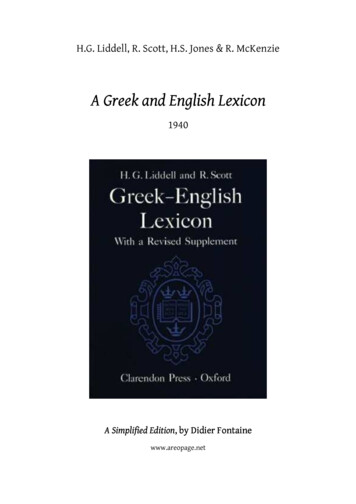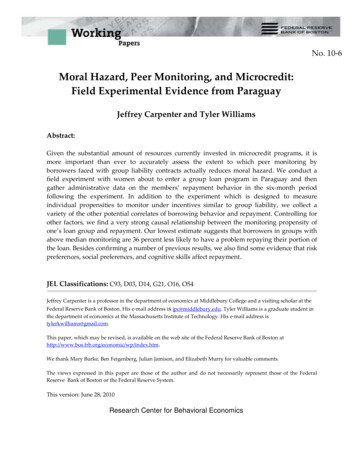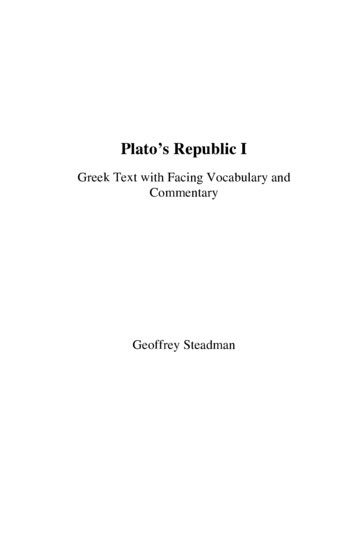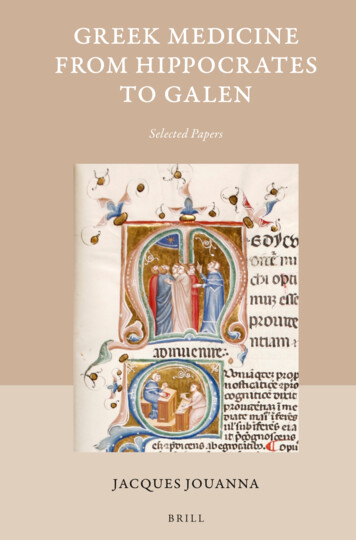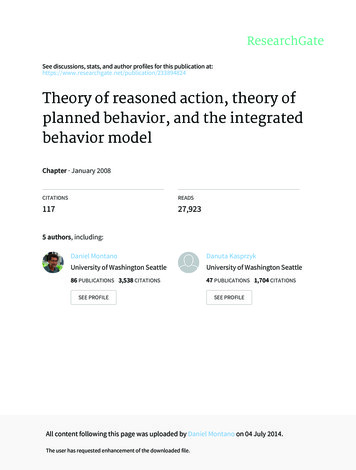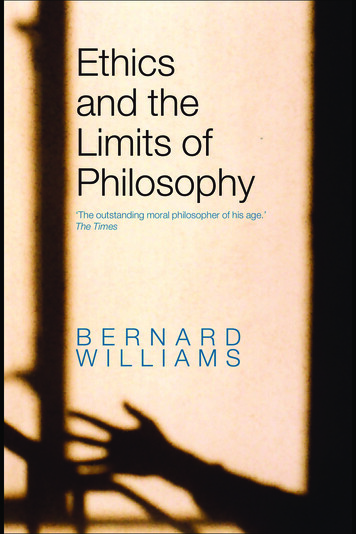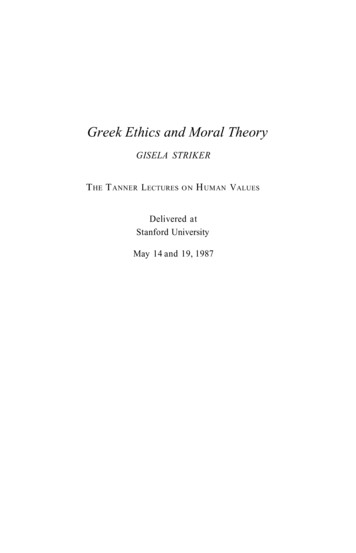
Transcription
Greek Ethics and Moral TheoryGISELA STRIKERT HE T ANNER LECTURESONH UMAN V ALUESDelivered atStanford UniversityMay 14 and 19, 1987
GISELA STRIKER is professor of philosophy at ColumbiaUniversity, New York City. She was born and educatedin Germany, where she received her doctorate from theUniversity of Göttingen in 1969. Until 1986 she taughtphilosophy at Göttingen. She also held visiting appointments at the universities of Stanford, Princeton, andHarvard. In 1984 she gave the Nellie Wallace lecturesat Oxford University. She has published monographsand articles on various aspects of ancient philosophy, including a study of Plato’s Philebus (Peras und Apeiron,–1970) and of the notion of a criterion of truth ( k rit erion––tes aletheias, 1974). In recent years, her work has focused mainly on Hellenistic epistemology and ethics.
Greek ethics has had a kind of renaissance in the last fewyears. A number of authors, tired, perhaps, of debates aboutforms of utilitarianism or technicalities of metaethics, have pointedto the classical Greek theories as offering a wider perspective.Three points in particular have been singled out for praise. First,Greek authors were usually concerned to provide an account ofthe good life for man — what they called eudaimonia, happiness — as opposed to focusing narrowly on right or good action.Second, this wider scope led them to treat seriously and withoutphilistine prejudices the question of motives for morality, or reasons for wanting to be good — a question that has been an embarrassment to both Kantians and utilitarians. Finally, the Greekphilosophers tended to be concerned with virtues of character,the traits that underlie or explain a disposition to act in the rightway, more than with principles of right action. This is an advantage for two reasons. First, it would seem that our evaluations ofpeople as distinct from actions must be based on a considerationof their character — indeed, even actions can hardly be understood or evaluated without regard to the agent’s motives, andmotives have more to do with character than with theoreticaljustification. Second, it seems that if ethics is to have some beneficial effect, preaching the rules of morality would be a most unpromising way of trying to achieve this. As Aristotle said perhapsmost clearly, what people are apt to do depends first and foremost upon their character, not on any knowledge of moral orlegal rules that they might possess. Hence we should study exThis is a considerably revised version of the lecture I gave at Stanford University. I have learned much from my commentators, Julia Annas, John Cooper,and Tony Long, though I could not attempt to do justice to all their suggestions.I am particularly grateful to John Cooper for letting me use his notes. MaryMothersill has helped me throughout with encouragement and advice, and, last butnot least, by correcting my English.[183]
184The Tanner Lectures on Human Valuescellence of character, try to find out what it is and how it comesabout, and avoid entanglement in discussions of moral epistemology or ethical foundationalism. The emphasis on virtue of character over action is connected with the theme of the good life,since, as the Greeks realized, what counts as a satisfactory life fora person will depend to a large extent on what she desires, anddesires are more closely tied to character than to reasoning.Still, such praise of ancient theories does not mean that weshould simply return to them. Closer inspection usually showsthat there were drawbacks as well as advantages. In fact, thesame authors who praise ancient ethics tend to tell us also thatthere is no chance of return. The conclusion can be quite pessimistic: modern moral theory is hardly any good; ancient ethicswas better but built upon assumptions that we can no longeraccept. So perhaps it is time to abandon the project as a seriousphilosophical enterprise.1Such radical skepticism, I think, is premature, and I proposeto take a closer look at the development of Greek ethical theoriesin the hope of finding out how ancient and modern questionsmight hang together. It seems to me that an examination ofancient theories that goes beyond the two great classics Plato andAristotle (usually, and wrongly, thought to represent all of Greekethics) might help us to see a little more clearly what if anythingwe could learn from them. Obviously, I cannot do this in detailhere. My remarks will be limited to a few fairly general pointsof strategy.For a modern reader the classical Greek treatments of ethicsare surprisingly reticent about what we have learned to consideras the most fundamental question — the justification of moraldecisions or the foundation of moral rules. Saying that those philosophers started from a different perspective, asking questionsabout the good life, will not really help to explain why they seem1See, for example, the postscript in Bernard Williams’s Ethics and the Limitsof Philosophy (Cambridge, Mass.: Harvard University Press, 1985).
[STRIKER]Greek Ethics and Moral Theory185to have paid so little attention to a central problem — one thatmust surely have been current in their time, given the fifth-centurydebates about, for example, the objectivity or relativity of moraland legal rules. Furthermore, modern ethics is after all a descendant of the same tradition, however complicated the historical development, and so one would expect there to be some connection. Hence we might ask, how could the question of thefoundation of moral rules appear so unimportant at the beginning, and when and where did it arise? I am going to argue thatour question did not get much attention in the early stages ofGreek ethical thinking, partly because it was confused with otherquestions, and partly because morality was not considered to bea question of rules until the time of the Stoics. However, the question did arise — and it might be that the first explicit debate aboutthe foundations of moral rules led to that split between questionsabout happiness and moral questions which is rightly deplored bymodern writers.IFirst, a very general outline of the type of theory I shall calleudaimonist. I will look at the four best-documented versions ofeudaimonism (Plato, Aristotle, Epicurus, and the Stoics) andask where and how questions about the foundations of moralitydid or should have come up.Greek ethical theories are theories about the good life; theirstarting point is Socrates’ question in the Gorgias (472C-D) —how should we live to be happy? Greek philosophers after Socrates assume that happiness or living well is an object of desirefor everyone. This might be taken in a fairly trivial sense, meaning no more than that everybody would rather be satisfied withtheir lives than otherwise. But these philosophers also assumethat happiness is a goal of action. This is no longer trivial, andnot just because one might believe that it is a matter of luck, notof one’s own efforts, whether one is living well. The main prob-
186The Tanner Lectures on Human Valueslem arises from the assumption that it makes sense to considerhappiness as one thing that we might try to achieve.Might not living well consist, not in achieving a single end,but rather in achieving or getting lots of different things, so thata desire for happiness should be understood simply as a secondorder desire to get what one wants most of the time, with noimplications about objects of first-order desires? If so, happinesscan hardly play the role of ultimate aim of action that the Greeksascribed to it — that for the sake of which everything in one’slife ought to be done, as the Stoics put it (see v. Arnim, Stoic.Vet. Fragm. 3.2, p. 3). For then to say that one does something“for the sake of happiness” is just to say that one does it becauseone wants to, and that is hardly an explanation. If happiness isto play the role of ultimate aim of desire and action, it must besomething more concrete — either a certain life-pattern or else alife lived in a certain sort of way.2 To say that happiness is theultimate end of action, then, seems to presuppose ( a ) that thereis a general answer to the question What sort of life can count asa good life for humans? ( b ) that every human being desires tolive a good life, and (c) that we do or should plan all our actionsin such a way that they lead or contribute to such a life.All of these assumptions may seem dubious. The first hassometimes been rejected on the ground that there can be no general answer to the question about a good life because individualsdiffer so much in character, talent, and inclinations that it makesno sense to look for a recipe that fits everyone. This seems to meto be a rather superficial point and easy to refute. W e need onlyto think of the notion of welfare to realize that there is probablyquite a long list of generally necessary conditions for a satisfactoryhuman life. A description of the good life in general will no2The first is suggested by classifications of kinds of lives (bioi), such as moneymaking, politics, or philosophy (see, e.g., Plato, Republic 9 S81C-E; Aristotle,Nicomachean Ethics [EN] 1, 1095b14-1096a5) ; the second by Prodikos’s famousparable about Herakles’ choice between the lives of virtue and vice (Xenophon,Memorabilia 2.1, 21-34).
[STRIKER]Greek Ethics and Moral Theory187doubt have to make room for many individual differences, but thisdoes not show that we could not try to find out what will beneeded by way of necessary conditions for everyone. A theoryof the human good can apply to individuals only as members ofthe species, but that does not mean that such a theory is uselessor impossible. (I do not mean to suggest that it is easy to determine what counts as common and what does not. Obviously, a“daily schedule for the happy person” would be ridiculous, butshould we include such things as education, opportunities to enjoymusic or theater, traveling, and so on ? )The second thesis — that every human being desires to live agood life — should probably be interpreted to mean that everyperson who knows what the good life is will desire it as his or herultimate aim (cf. Plato, Philebus 11D). But is this true? Somepeople, to all appearances, do not wish to have a good life in therequired sense, for example, ascetics who deliberately deprivethemselves of things that ordinary people would find indispensable, or monomaniacs who devote their lives to a single pursuit,like painting pictures or solving mathematical problems. It seemsquestion-begging to insist that such persons have a wrongheadedidea of what is good for them, and that if they had been broughtup in more enlightened ways, they would have realized that they“really” wanted to be prosperous, sociable human beings likeeverybody else. This objection should be taken seriously, but itdoes not show that it makes no sense to assume that people normally desire to lead a good human life, and indeed we seem toassume just that when we try to decide about how to treat others.For certainly even if some people do not want the things most ofus desire, we do not feel justified in depriving them of the opportunity to have them. Thus ascetics and monomaniacs must betreated as exceptions that will not disprove the thesis that humanbeings generally desire to lead a good human life.The last point — that all our actions are or should be directedtoward the good life — is more difficult. Aristotle raises the ques-
188The Tanner Lectures on Human Valuestion whether we should assume that there is a single ultimateend in the first chapter of his Nicomachean Ethics, but it is notclear whether he wishes to maintain, as a factual claim, that alldeliberate human action aims at happiness as its ultimate goal or,rather, more modestly, that rational agents should try to organizetheir lives in such a way that they can be justified in terms of atrue conception of the good life. Not all eudaimonist theorists areas cautious as Aristotle on this point. For Socrates, Epicurus, andthe Stoics, the good for man is an end we pursue in all our actions,whether we know what it is or not, so that we will be unhappyor disappointed with our lives if we have a wrong conceptionof the good. If we find that claim difficult to accept, we may stillstudy the Greek theories on the basis of the more limited interpretation suggested by Aristotle.Given the basic assumption that there is an ultimate end ofdesire and action, to be called happiness or living well, the taskof ethics will be to establish what this end is —what happinessconsists in — and how we may best achieve it. I shall use the term“eudaimonism” to refer to theories that use this framework.Philosophers vary in their views of how we determine the end.Aristotle relies on his natural teleology; 3 Plato and the two Hellenistic schools seem to start from a conception of the good, fromwhich they then derive a definition of the good life. That definition largely determines the rest of the theory, which will consistin an investigation of the constituents of the good life and a discussion of how we may achieve the good life through action.3This is not the doctrine that the natural world is governed by a rationalplanner who has arranged it in such a way that each part contributes to the goodorder of the whole. The Stoics, but not Aristotle, held such a view. Aristotle’steleology is the theory according to which natural things, and organisms in particular, have a specific form and activity that is their “end” ( t e l o s ) in the sense thatit is (a) the outcome of their normal development from seed to maturity and ( b ) thekind of life that their characteristic capacities, when fully developed, permit themto lead. The latter is what Aristotle calls the “function” ( e r g o n ) of an organism.
[STRIKER]Greek Ethics and Moral Theory189IINow note that eudaimonism as described so far has as yetnothing to do with moral theory. The topic of virtue comes inby
life ought to be done, as the Stoics put it (see v. Arnim, Stoic. Vet. Fragm. 3.2, p. 3). For then to say that one does something “for the sake of happiness” is just to say that one does it because one wants to, and that is hardly an explanation. If happiness is to play the role of
